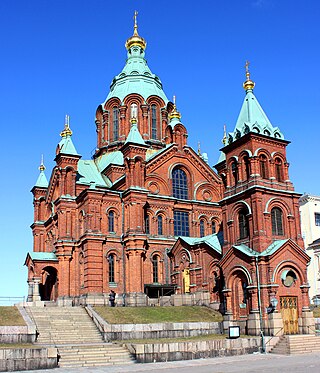
A mummy is a dead human or an animal whose soft tissues and organs have been preserved by either intentional or accidental exposure to chemicals, extreme cold, very low humidity, or lack of air, so that the recovered body does not decay further if kept in cool and dry conditions. Some authorities restrict the use of the term to bodies deliberately embalmed with chemicals, but the use of the word to cover accidentally desiccated bodies goes back to at least the early 17th century.

The Evangelical Lutheran Church of Finland is a national church of Finland. It is part of the Lutheran branch of Christianity. The church has a legal position as a national church in the country, along with the Orthodox Church of Finland.

Embalming is the art and science of preserving human remains by treating them with chemicals in modern times to forestall decomposition. This is usually done to make the deceased suitable for viewing as part of the funeral ceremony or keep them preserved for medical purposes in an anatomical laboratory. The three goals of embalming are sanitization, presentation, and preservation, with restoration being an important additional factor in some instances. Performed successfully, embalming can help preserve the body for many years. Embalming has a long, cross-cultural history, with many cultures giving the embalming processes religious meaning.

The Orthodox Church of Finland or Finnish Orthodox Church is an autonomous Eastern Orthodox archdiocese of the Ecumenical Patriarchate of Constantinople. The church has a legal position as a national church in the country, along with the Evangelical Lutheran Church of Finland.

Tornio is a city and municipality in Lapland, Finland. The city forms a cross-border twin city together with Haparanda on the Swedish side. The municipality covers an area of 1,348.83 square kilometres (520.79 sq mi), of which 161.59 km2 (62.39 sq mi) is water. The population density is 17.66 inhabitants per square kilometre (45.7/sq mi), with a total population of 20,989.

Keminmaa is a municipality of Finland. It is located near the towns of Kemi and Tornio in the Lapland region.
Vicar of Christ is a term used in different ways and with different theological connotations throughout history. The original notion of a vicar is as an "earthly representative of Christ", but it is also used in the sense of "person acting as parish priest in place of a real person." The title is now used in Catholicism to refer to the bishops, and more specifically, was historically used to refer to the Bishop of Rome.

The Catholic Church in Finland is part of the worldwide Catholic Church, under the spiritual leadership of the Pope in Rome.
Cardinal vicar is a title commonly given to the vicar general of the Diocese of Rome for the portion of the diocese within Italy. The official title, as given in the Annuario Pontificio, is vicar general of His Holiness.

Uspenski Cathedral is a Greek Orthodox or Eastern Orthodox cathedral in Helsinki, Finland, and main cathedral of the Orthodox Church of Finland, dedicated to the Dormition of the Theotokos. Its name comes from the Old Church Slavonic word uspenie, which denotes the Dormition. It is the largest Greek Orthodox church in both Northern and Western Europe.

The Kemi Mine is owned by Outokumpu Chrome Oy, a subsidiary of Outokumpu Oyj. It is located in Elijärvi, in the municipality of Keminmaa, to the north of Kemi. The Kemi Mine is the largest underground mine in Finland, with an annual production capacity of 2.7 million tonnes of ore. It is also part of the integrated ferrochrome and stainless steel manufacturing chain owned by Outokumpu in the Kemi-Tornio region. The Kemi Mine has approximately 400 employees every day, both employees of Outokumpu and contractors.
Juutila Foundry is the oldest working bell foundry in Finland. Juutila foundry was founded in 1881.
Mummification was practiced in the Philippines only on those able to prove the loss of baby teeth. The baby teeth represented youth, losing them illustrated wisdom gained in their mouth. It also portrayed the journey of maturity. Dying without losing baby teeth was a sign of someone who never reached their full potential. Once you lose and grow your first grill, the second time you lose the teeth, it's time to go. That's because they were given a chance of proper dental hygiene. The caves containing the mummies were untouched until the 19th century.

Metropolitan Elia is the current archbishop of the Finnish Orthodox Church since 1 December 2024 and his home church is the Uspenski Cathedral. Previously he served as metropolitan of Oulu of the Finnish Orthodox Church. He was consecrated on 11 January 2015. He follows in this position Metropolitan Panteleimon, who retired in June 2013. His home church was the Holy Trinity Cathedral of Oulu.

Espoonlahti Church is a Lutheran church situated in Espoonlahti, Espoo, Finland. It was designed by architects Timo and Tuomo Suomalainen, architects of the Rock Church, who were also members of the Espoonlahti congregation. The groundstone for the church was set in August 1979 and the building was completed in 1980. The organs were built and assembled in 1983. As the number of members in the congregation grew rapidly, additional rooms were soon needed. This new phase of building was completed in 1987, also by the architects Suomalainen.

Pihlajavesi Old Church, also known as Pihlajavesi Wilderness Church, is a Lutheran church in the town of Pihlajavesi, in Central Finland. It is called 'Wilderness Church', because it is situated in a forest outside the main populated areas.

Taavetti Lukkarinen was a former Kemi Oy's foreman from Keminmaa, Finland, who was sentenced to death for treason after helping German prisoners of war who had fled the Kirov Railway construction site via Finnish Lapland to Sweden. He was not an actual recruiter of the Jäger Movement.
Vartija is a quarterly theological magazine based in Helsinki, Finland. It was a print publication between 1888 and 2017 and became an online-only periodical in 2017. The magazine is not attached to any church in Finland and supports both conservatism and radicalism since its establishment.

Sodankylä Old Church is a 17th-century wooden church located near the Kitinen River in the Sodankylä municipality in Lapland, Finland.















